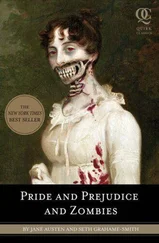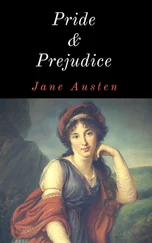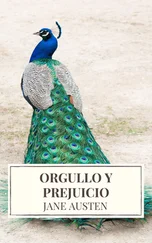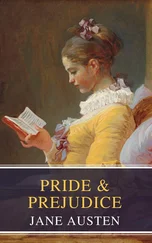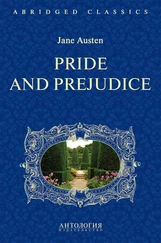agreeably engaged. I have been meditating on the very great
pleasure which a pair of fine eyes in the face of a pretty woman
can bestow.”
Miss Bingley immediately fixed her eyes on his face, and desired
he would tell her what lady had the credit of inspiring such
reflections. Mr. Darcy replied with great intrepidity:
“Miss Elizabeth Bennet.”
“Miss Elizabeth Bennet!” repeated Miss Bingley. “I am all
astonishment. How long has she been such a favourite?—and pray,
when am I to wish you joy?”
“That is exactly the question which I expected you to ask. A
lady’s imagination is very rapid; it jumps from admiration to
love, from love to matrimony, in a moment. I knew you would be
wishing me joy.”
“Nay, if you are serious about it, I shall consider the matter is
absolutely settled. You will be having a charming mother-in-law,
indeed; and, of course, she will always be at Pemberley with
you.”
He listened to her with perfect indifference while she chose to
entertain herself in this manner; and as his composure convinced
her that all was safe, her wit flowed long.
Mr. Bennet’s property consisted almost entirely in an estate of
two thousand a year, which, unfortunately for his daughters, was
entailed, in default of heirs male, on a distant relation; and
their mother’s fortune, though ample for her situation in life,
could but ill supply the deficiency of his. Her father had been
an attorney in Meryton, and had left her four thousand pounds.
She had a sister married to a Mr. Phillips, who had been a clerk
to their father and succeeded him in the business, and a brother
settled in London in a respectable line of trade.
The village of Longbourn was only one mile from Meryton; a most
convenient distance for the young ladies, who were usually
tempted thither three or four times a week, to pay their duty to
their aunt and to a milliner’s shop just over the way. The two
youngest of the family, Catherine and Lydia, were particularly
frequent in these attentions; their minds were more vacant than
their sisters’, and when nothing better offered, a walk to
Meryton was necessary to amuse their morning hours and furnish
conversation for the evening; and however bare of news the
country in general might be, they always contrived to learn some
from their aunt. At present, indeed, they were well supplied both
with news and happiness by the recent arrival of a militia
regiment in the neighbourhood; it was to remain the whole winter,
and Meryton was the headquarters.
Their visits to Mrs. Phillips were now productive of the most
interesting intelligence. Every day added something to their
knowledge of the officers’ names and connections. Their lodgings
were not long a secret, and at length they began to know the
officers themselves. Mr. Phillips visited them all, and this
opened to his nieces a store of felicity unknown before. They
could talk of nothing but officers; and Mr. Bingley’s large
fortune, the mention of which gave animation to their mother, was
worthless in their eyes when opposed to the regimentals of an
ensign.
After listening one morning to their effusions on this subject,
Mr. Bennet coolly observed:
“From all that I can collect by your manner of talking, you must
be two of the silliest girls in the country. I have suspected it
some time, but I am now convinced.”
Catherine was disconcerted, and made no answer; but Lydia, with
perfect indifference, continued to express her admiration of
Captain Carter, and her hope of seeing him in the course of the
day, as he was going the next morning to London.
“I am astonished, my dear,” said Mrs. Bennet, “that you should be
so ready to think your own children silly. If I wished to think
slightingly of anybody’s children, it should not be of my own,
however.”
“If my children are silly, I must hope to be always sensible of
it.”
“Yes—but as it happens, they are all of them very clever.”
“This is the only point, I flatter myself, on which we do not
agree. I had hoped that our sentiments coincided in every
particular, but I must so far differ from you as to think our two
youngest daughters uncommonly foolish.”
“My dear Mr. Bennet, you must not expect such girls to have the
sense of their father and mother. When they get to our age, I
dare say they will not think about officers any more than we do.
I remember the time when I liked a red coat myself very well—and,
indeed, so I do still at my heart; and if a smart young colonel,
with five or six thousand a year, should want one of my girls I
shall not say nay to him; and I thought Colonel Forster looked
very becoming the other night at Sir William’s in his
regimentals.”
“Mamma,” cried Lydia, “my aunt says that Colonel Forster and
Captain Carter do not go so often to Miss Watson’s as they did
when they first came; she sees them now very often standing in
Clarke’s library.”
Mrs. Bennet was prevented replying by the entrance of the footman
with a note for Miss Bennet; it came from Netherfield, and the
servant waited for an answer. Mrs. Bennet’s eyes sparkled with
pleasure, and she was eagerly calling out, while her daughter
read,
“Well, Jane, who is it from? What is it about? What does he say?
Well, Jane, make haste and tell us; make haste, my love.”
“It is from Miss Bingley,” said Jane, and then read it aloud.
“MY DEAR FRIEND,—
“If you are not so compassionate as to dine to-day with Louisa
and me, we shall be in danger of hating each other for the rest
of our lives, for a whole day’s _tête-à-tête_ between two women
can never end without a quarrel. Come as soon as you can on
receipt of this. My brother and the gentlemen are to dine with
the officers.—Yours ever,
“CAROLINE BINGLEY”
“With the officers!” cried Lydia. “I wonder my aunt did not tell
us of _that_.”
“Dining out,” said Mrs. Bennet, “that is very unlucky.”
“Can I have the carriage?” said Jane.
“No, my dear, you had better go on horseback, because it seems
likely to rain; and then you must stay all night.”
“That would be a good scheme,” said Elizabeth, “if you were sure
that they would not offer to send her home.”
“Oh! but the gentlemen will have Mr. Bingley’s chaise to go to
Meryton, and the Hursts have no horses to theirs.”
“I had much rather go in the coach.”
“But, my dear, your father cannot spare the horses, I am sure.
They are wanted in the farm, Mr. Bennet, are they not?”
“They are wanted in the farm much oftener than I can get them.”
“But if you have got them to-day,” said Elizabeth, “my mother’s
purpose will be answered.”
She did at last extort from her father an acknowledgment that the
horses were engaged. Jane was therefore obliged to go on
horseback, and her mother attended her to the door with many
cheerful prognostics of a bad day. Her hopes were answered; Jane
had not been gone long before it rained hard. Her sisters were
uneasy for her, but her mother was delighted. The rain continued
the whole evening without intermission; Jane certainly could not
come back.
“This was a lucky idea of mine, indeed!” said Mrs. Bennet more
than once, as if the credit of making it rain were all her own.
Читать дальше



